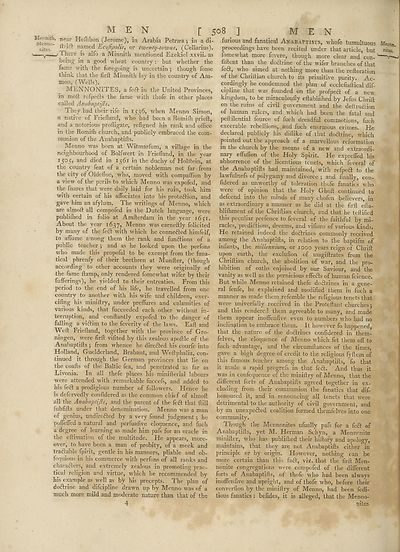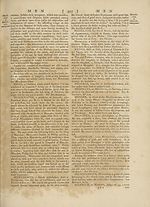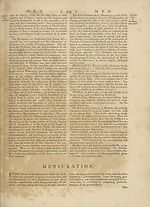Encyclopaedia Britannica, or, a Dictionary of arts, sciences, and miscellaneous literature : enlarged and improved. Illustrated with nearly six hundred engravings > Volume 13, MAT-MIC
(550) Page 508
Download files
Complete book:
Individual page:
Thumbnail gallery: Grid view | List view

Mennith,
ivlcnno-
nites.
MEN [
tiear Heflibon (Jerome), in Arabia Petrgea ; in a di-
ibift named Ecojtpolis, or twenty-towns, (Cellarius).
' Phere is alfo a Minnith mentioned Ezekiel xxvii. as
being in a good wheat country : but whether the
fame with the foregoing is uncertain ; though fome
think that the fir ft Minnith lay in the country of Am¬
mon, (Wells).
MEN
MENNONITES, a fcft in the United Provinces,
in moft refpedts the fame with thofe in other places
called Anabaptijls.
They had their rife in 1536, when Menno Simon,
a native of Friefland, who had been a Romiih prieft,
and a notorious profligate, refigned his rank and office
in the Romiffi church, and publicly embraced tlie com¬
munion of the Anabaptifts.
Menno was born at Witmarfum, a village in the
neighbourhood of Bolfwert in Friefland, in the year
1505, and died in 1361 in the duchy of Holftein, at
the country feat of a certain nobleman not far from
the city of Oldefloe, who, moved with compaffion by
a view of the perils to which Menno was expofed, and
the fnares that were daily laid for his ruin, took him
with certain of his aflbciates into his protection, and
gave him an afylum. The writings of Menno, which
are almoft all compoled in the Dutch language, were
publifhed in folio at Amfterdam in the year t6$i.
About the year 1637, Menno was earneftly folicited
by many of the feCt with which he connected himfelf,
to aflume among them the rank and functions of a
public teacher ; and as he looked upon the perfons
who made this propofal to be exempt from the fana¬
tical phrenfy of their brethren at Munfter, (though
according to other accounts they were originally of
the fame ftamp, only rendered fomewhat wifer by their
fufferings), he yielded to their entreaties. From this
period to the end of his life, he travelled from one
country to another with his wife and children, exer-
cifing hh miniftry, under preflures and calamities of
various kinds, that fucceeded each other without in¬
terruption, and conftantly expofed to the danger of
falling a viftim to the feverity of the laws. Eaft and
Weft Friefland, together with the province of Gro¬
ningen, were firft vifited by this zealous apoftle of the
Anabaptifts ; from whence he direCted his courfe into
Holland, Guelderland, Brabant, and Weftphalia, con¬
tinued it through the German provinces that lie on
the coafts of the Baltic fea, and penetrated as far as
Livonia. In all thefe places liis minifterial labours
were attended with remarkable fuccefs, and added to
his fed a prodigious number of followers. Hence he
is defervedly confidered as the common chief of almoft
all the Anabaptijls, and the parent of the fed that ftill
iubfifts under that denomination. Menno was a man
of genius, undireded by a very found judgment ; he
pofleffed a natural and perfuafive eloquence, and fuch
a degree of learning as made him pafs for an oracle in
the eftimation of the multitude. He appears, more¬
over, to have been a man of probity, of a meek and
tradable fpirit, gentle in his manners, pliable and ob-
fequious in his commerce with perfons of all ranks and
charaders, and extremely zealous in promoting prac¬
tical religion and virtue, which he recommended by
his example as well as by bis precepts. The plan of
dodrine and difcipline drawn up by Menno was of a
much more mild and moderate nature than that of the
4
5°8. ]
furious and fanatical Anabaptists, whofe tumultuous
proceedings have been recited under that article, but
fomewhat more fcvere, though more clear and con-
fiftent than the dodrine of the wifer branches of that
fed, who aimed at nothing more than the reftoration
of the Chritiian church to its primitive purity. Ac¬
cordingly he condemned the plan of ecclefiaftical dif¬
cipline that was founded on the profped of a new
kingdom, to be miraculoufly eftabliihed by Jefus Chrift
on the ruins of civil government and the deltrudion
of human rulers, and which had been the fatal and
peftilential fource of fuch dreadful commotions, fuch
execrable rebellions, and fuch enormous crimes. He
declared publicly his dillike of that dodrine, which
pointed out the approach of a marvellous reformation
in the church by the means of a new and extraordi¬
nary effufion of the Holy Spirit. He expreffed his
abhorrence of the licentious tenets, which feveral of
the Anabaptifts had maintained, with refped to the
lawfulnefs of polygamy and divorce ; and finally, con¬
fidered as unworthy of toleration thofe fanatics who
were of. opinion that the Holy Ghoft continued to
defeend into the minds of many chofen believers, in
as.extraordinary a manner as he did at the firft efta-
bliffiment of the Chriftian church, and that he teftified
this peculiar prefence to feveral of the faithful by mi¬
racles, predidions, dreams, and vifions of various kinds.
He retained indeed the dodrines commonly received
among the Anabaptifts, in relation to the baptifm of
infants, the millennium, or 1000 years reign of Chrift
upon earth, the exclufion of magiftrates from the
Chriftian church, the abolition of war, and the pro¬
hibition of oaths enjoined by our Saviour, and the
vanity as well as the pernicious effeds of human feience.
But while Menno retained thefe dodrines in a gene¬
ral fenfe, he explained and modified them in fuch a
manner as made them refemble the religious tenets that
were univerfally received in the Proteftant churches 5
and this rendered them agreeable to many, and made
them appear inoffenfive even to numbers who had no
inclination to embrace them. It however fo happened,
that the nature of the dodrines confidered in them-
felves, the eloquence of Menno which fet them off to
fuch advantage, and the circumftances of the times,
gave a high degree of credit to the religious fyftem of
this famous teacher among the Anabaptifts, fo that
it made a rapid progrefs in that fed. And thus it
was in confequence of the miniftry of Menno, that the
different forts of Anabaptifts agreed together in ex¬
cluding from their communion the fanatics that dif-
honoured it, and in renouncing all tenets that were
detrimental to the authority of civil government, and
by an unexpeded coalition formed themfelves into one
community.
Though the Mennonites ufually pafs for a fed of
A.nabaptifts, yet M. Herman Schyn, a Mennonite
minifter, who has publiflied their hiftory and apology,
maintains, that they are not Anabaptifts either' in
principle or by origin. However, nothing can be
more certain than this fad, viz. that the "firft Men¬
nonite congregations were compofed of the different
forts of Anabaptifts, of thofe who had been always
inoffenfive and upright, and of thofe who, before their
converfion by the miniftry of Menno, had been fedi-
tious fanatics : befides, it is alleged, that the Menno-
tiites
MeniHj.
nites,
ivlcnno-
nites.
MEN [
tiear Heflibon (Jerome), in Arabia Petrgea ; in a di-
ibift named Ecojtpolis, or twenty-towns, (Cellarius).
' Phere is alfo a Minnith mentioned Ezekiel xxvii. as
being in a good wheat country : but whether the
fame with the foregoing is uncertain ; though fome
think that the fir ft Minnith lay in the country of Am¬
mon, (Wells).
MEN
MENNONITES, a fcft in the United Provinces,
in moft refpedts the fame with thofe in other places
called Anabaptijls.
They had their rife in 1536, when Menno Simon,
a native of Friefland, who had been a Romiih prieft,
and a notorious profligate, refigned his rank and office
in the Romiffi church, and publicly embraced tlie com¬
munion of the Anabaptifts.
Menno was born at Witmarfum, a village in the
neighbourhood of Bolfwert in Friefland, in the year
1505, and died in 1361 in the duchy of Holftein, at
the country feat of a certain nobleman not far from
the city of Oldefloe, who, moved with compaffion by
a view of the perils to which Menno was expofed, and
the fnares that were daily laid for his ruin, took him
with certain of his aflbciates into his protection, and
gave him an afylum. The writings of Menno, which
are almoft all compoled in the Dutch language, were
publifhed in folio at Amfterdam in the year t6$i.
About the year 1637, Menno was earneftly folicited
by many of the feCt with which he connected himfelf,
to aflume among them the rank and functions of a
public teacher ; and as he looked upon the perfons
who made this propofal to be exempt from the fana¬
tical phrenfy of their brethren at Munfter, (though
according to other accounts they were originally of
the fame ftamp, only rendered fomewhat wifer by their
fufferings), he yielded to their entreaties. From this
period to the end of his life, he travelled from one
country to another with his wife and children, exer-
cifing hh miniftry, under preflures and calamities of
various kinds, that fucceeded each other without in¬
terruption, and conftantly expofed to the danger of
falling a viftim to the feverity of the laws. Eaft and
Weft Friefland, together with the province of Gro¬
ningen, were firft vifited by this zealous apoftle of the
Anabaptifts ; from whence he direCted his courfe into
Holland, Guelderland, Brabant, and Weftphalia, con¬
tinued it through the German provinces that lie on
the coafts of the Baltic fea, and penetrated as far as
Livonia. In all thefe places liis minifterial labours
were attended with remarkable fuccefs, and added to
his fed a prodigious number of followers. Hence he
is defervedly confidered as the common chief of almoft
all the Anabaptijls, and the parent of the fed that ftill
iubfifts under that denomination. Menno was a man
of genius, undireded by a very found judgment ; he
pofleffed a natural and perfuafive eloquence, and fuch
a degree of learning as made him pafs for an oracle in
the eftimation of the multitude. He appears, more¬
over, to have been a man of probity, of a meek and
tradable fpirit, gentle in his manners, pliable and ob-
fequious in his commerce with perfons of all ranks and
charaders, and extremely zealous in promoting prac¬
tical religion and virtue, which he recommended by
his example as well as by bis precepts. The plan of
dodrine and difcipline drawn up by Menno was of a
much more mild and moderate nature than that of the
4
5°8. ]
furious and fanatical Anabaptists, whofe tumultuous
proceedings have been recited under that article, but
fomewhat more fcvere, though more clear and con-
fiftent than the dodrine of the wifer branches of that
fed, who aimed at nothing more than the reftoration
of the Chritiian church to its primitive purity. Ac¬
cordingly he condemned the plan of ecclefiaftical dif¬
cipline that was founded on the profped of a new
kingdom, to be miraculoufly eftabliihed by Jefus Chrift
on the ruins of civil government and the deltrudion
of human rulers, and which had been the fatal and
peftilential fource of fuch dreadful commotions, fuch
execrable rebellions, and fuch enormous crimes. He
declared publicly his dillike of that dodrine, which
pointed out the approach of a marvellous reformation
in the church by the means of a new and extraordi¬
nary effufion of the Holy Spirit. He expreffed his
abhorrence of the licentious tenets, which feveral of
the Anabaptifts had maintained, with refped to the
lawfulnefs of polygamy and divorce ; and finally, con¬
fidered as unworthy of toleration thofe fanatics who
were of. opinion that the Holy Ghoft continued to
defeend into the minds of many chofen believers, in
as.extraordinary a manner as he did at the firft efta-
bliffiment of the Chriftian church, and that he teftified
this peculiar prefence to feveral of the faithful by mi¬
racles, predidions, dreams, and vifions of various kinds.
He retained indeed the dodrines commonly received
among the Anabaptifts, in relation to the baptifm of
infants, the millennium, or 1000 years reign of Chrift
upon earth, the exclufion of magiftrates from the
Chriftian church, the abolition of war, and the pro¬
hibition of oaths enjoined by our Saviour, and the
vanity as well as the pernicious effeds of human feience.
But while Menno retained thefe dodrines in a gene¬
ral fenfe, he explained and modified them in fuch a
manner as made them refemble the religious tenets that
were univerfally received in the Proteftant churches 5
and this rendered them agreeable to many, and made
them appear inoffenfive even to numbers who had no
inclination to embrace them. It however fo happened,
that the nature of the dodrines confidered in them-
felves, the eloquence of Menno which fet them off to
fuch advantage, and the circumftances of the times,
gave a high degree of credit to the religious fyftem of
this famous teacher among the Anabaptifts, fo that
it made a rapid progrefs in that fed. And thus it
was in confequence of the miniftry of Menno, that the
different forts of Anabaptifts agreed together in ex¬
cluding from their communion the fanatics that dif-
honoured it, and in renouncing all tenets that were
detrimental to the authority of civil government, and
by an unexpeded coalition formed themfelves into one
community.
Though the Mennonites ufually pafs for a fed of
A.nabaptifts, yet M. Herman Schyn, a Mennonite
minifter, who has publiflied their hiftory and apology,
maintains, that they are not Anabaptifts either' in
principle or by origin. However, nothing can be
more certain than this fad, viz. that the "firft Men¬
nonite congregations were compofed of the different
forts of Anabaptifts, of thofe who had been always
inoffenfive and upright, and of thofe who, before their
converfion by the miniftry of Menno, had been fedi-
tious fanatics : befides, it is alleged, that the Menno-
tiites
MeniHj.
nites,
Set display mode to:
![]() Universal Viewer |
Universal Viewer | ![]() Mirador |
Large image | Transcription
Mirador |
Large image | Transcription
Images and transcriptions on this page, including medium image downloads, may be used under the Creative Commons Attribution 4.0 International Licence unless otherwise stated. ![]()
| Permanent URL | https://digital.nls.uk/192668312 |
|---|
| Attribution and copyright: |
|
|---|
| Description | Ten editions of 'Encyclopaedia Britannica', issued from 1768-1903, in 231 volumes. Originally issued in 100 weekly parts (3 volumes) between 1768 and 1771 by publishers: Colin Macfarquhar and Andrew Bell (Edinburgh); editor: William Smellie: engraver: Andrew Bell. Expanded editions in the 19th century featured more volumes and contributions from leading experts in their fields. Managed and published in Edinburgh up to the 9th edition (25 volumes, from 1875-1889); the 10th edition (1902-1903) re-issued the 9th edition, with 11 supplementary volumes. |
|---|---|
| Additional NLS resources: |
|

